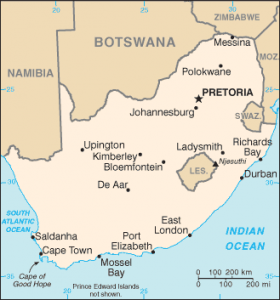NewsDesk @bactiman63
The South Africa National Institute for Communicable Diseases (NICD) reported recently an increase in pertussis, or whooping cough in the first nine months of 2022.

Very few pertussis cases were reported through the notifiable medical conditions (NMC) surveillance system in 2020 (n=169) and 2021 (n=27) in South Africa, likely as a result of decreased transmission related to non-pharmaceutical interventions to prevent the spread of SARS-CoV-2.
From the beginning of 2022 to 15 September, 147 pertussis cases were notified, with a steady increase in the number of cases reported since May and a sharp increase from July (n= 23 cases) through August (n = 33) and September (n = 53).
Of the 147 cases, 77% were children less than 5 years of age (113/147) of which 89 (79%) were children less than 3 months. The majority of cases 42%, (62/147) were from the Western Cape. In July and August 2022, the cases reported were evenly distributed across provinces and in keeping with numbers reported before COVID-19, while in September 2022, the majority of cases, 79% (38/48) were reported from Western Cape and numbers higher than those reported from this province pre-COVID-19.
Subscribe to Outbreak News TV on YouTube
Of the 38 cases reported from the Western Cape in September, 89% (34/38) of cases were observed from children less than 5 years of which 74% (25/34) were children less than 3 months. Of the 34 children less than 5 years of age, only 26 have vaccination statuses, of which 65% (17/26) were up to date with their vaccinations.
Pertussis, commonly known as ‘whooping cough’ is a vaccine-preventable disease caused by Bordetella pertussis and is a notifiable medical condition according to the National Health Act, 2003 (ACT NO. 61 0F 2003). Immunity following vaccination is thought to last for 5-6 years. Episodic increases in pertussis cases occur in vaccinated populations every 3-5 years.
- Corsica reports first autochthonous case of dengue
- Lassa virus endemic area may expand dramatically in coming decades: Scripps Research
- HDSA Tampa Team Hope Walk Returns December 3rd
- Marijuana-induced psychosis: An interview with author, Terry Hammond
- Spain reports first H5N1 avian influenza case: Media report
- Adenovirus cases rise to near 2,000 in Hanoi
- Ho Chi Minh City dengue cases up 590% in 2022
- Canada: Nova Scotia reports increase in HIV cases
- Uganda reports two additional confirmed Ebola cases, Bunyangabu becomes the 4th district with a case

